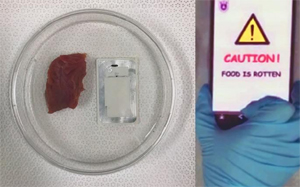



Date:29/06/18
 When it comes to the smell test, the nose isn't always the best judge of food quality.
When it comes to the smell test, the nose isn't always the best judge of food quality.
Now, in a study appearing in ACS' journal Nano Letters, scientists report that they have developed a wireless tagging device that can send signals to smartphones warning consumers and food distributors when meat and other perishables have spoiled.
The researchers say this new sensor could improve the detection of rotten food so it is tossed before consumers eat it.
Every year, 48 million people get sick from foodborne illnesses, according to the U.S. Centers for Disease Control and Prevention.
Of these, about 125,000 people are hospitalized and 3,000 die.
Traditionally, many consumers just smell a food to detect spoilage, but this technique is only as reliable as the sniffer's nose. At the other end of the spectrum, food inspectors often use bulky, expensive equipment to detect harmful microbes.
Scientists are investigating other approaches, including near field communication (NFC) labeling, that are both portable and dependable.
NFC devices wirelessly transmit information over short distances, usually less than 4 inches. They are similar to the radio frequency identification products retailers use to track inventory and shipments.
Building on this idea, Lijia Pan, Yi Shi, Guihua Yu and colleagues sought to incorporate a sensitive switch into NFC labeling tags to detect food spoilage using a smartphone.
The scientists created a nanostructured, conductive, polymer-based gas sensor that can detect substances called biogenic amines (BAs) that give decomposing meat its bad odor. Then the team embedded these sensors into NFCs placed next to meats. After the meats had been stored for 24 hours at 86 degrees Fahrenheit, the researchers found that the sensors successfully detected significant amounts of BAs. The sensors then switched on the NFCs so they could transmit this information to a nearby smartphone.
Device Sends Rotten Food Warning to Smartphones, Performs Ultimate Smell Test
 When it comes to the smell test, the nose isn't always the best judge of food quality.
When it comes to the smell test, the nose isn't always the best judge of food quality.Now, in a study appearing in ACS' journal Nano Letters, scientists report that they have developed a wireless tagging device that can send signals to smartphones warning consumers and food distributors when meat and other perishables have spoiled.
The researchers say this new sensor could improve the detection of rotten food so it is tossed before consumers eat it.
Every year, 48 million people get sick from foodborne illnesses, according to the U.S. Centers for Disease Control and Prevention.
Of these, about 125,000 people are hospitalized and 3,000 die.
Traditionally, many consumers just smell a food to detect spoilage, but this technique is only as reliable as the sniffer's nose. At the other end of the spectrum, food inspectors often use bulky, expensive equipment to detect harmful microbes.
Scientists are investigating other approaches, including near field communication (NFC) labeling, that are both portable and dependable.
NFC devices wirelessly transmit information over short distances, usually less than 4 inches. They are similar to the radio frequency identification products retailers use to track inventory and shipments.
Building on this idea, Lijia Pan, Yi Shi, Guihua Yu and colleagues sought to incorporate a sensitive switch into NFC labeling tags to detect food spoilage using a smartphone.
The scientists created a nanostructured, conductive, polymer-based gas sensor that can detect substances called biogenic amines (BAs) that give decomposing meat its bad odor. Then the team embedded these sensors into NFCs placed next to meats. After the meats had been stored for 24 hours at 86 degrees Fahrenheit, the researchers found that the sensors successfully detected significant amounts of BAs. The sensors then switched on the NFCs so they could transmit this information to a nearby smartphone.
Views: 463
©ictnews.az. All rights reserved.Similar news
- Justin Timberlake takes stake in Facebook rival MySpace
- Wills and Kate to promote UK tech sector at Hollywood debate
- 35% of American Adults Own a Smartphone
- How does Azerbaijan use plastic cards?
- Imperial College London given £5.9m grant to research smart cities
- Search and Email Still the Most Popular Online Activities
- Nokia to ship Windows Phone in time for holiday sales
- Internet 'may be changing brains'
- Would-be iPhone buyers still face weeks-long waits
- Under pressure, China company scraps Steve Jobs doll
- Jobs was told anti-poaching idea "likely illegal"
- Angelic "Steve Jobs" loves Android in Taiwan TV ad
- Kinect for Windows gesture sensor launched by Microsoft
- Kindle-wielding Amazon dips toes into physical world
- Video game sales fall ahead of PlayStation Vita launch





















